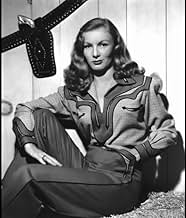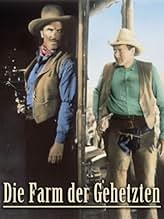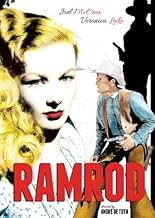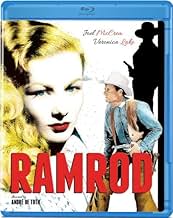CALIFICACIÓN DE IMDb
6.7/10
2 k
TU CALIFICACIÓN
Cuenta la historia sobre una violenta disputa entre Connie Dickason, dueña del rancho Circle 66, y el ganadero Frank Ivey, quien se autoproclamó jefe de unas tierras de pastoreo públicas.Cuenta la historia sobre una violenta disputa entre Connie Dickason, dueña del rancho Circle 66, y el ganadero Frank Ivey, quien se autoproclamó jefe de unas tierras de pastoreo públicas.Cuenta la historia sobre una violenta disputa entre Connie Dickason, dueña del rancho Circle 66, y el ganadero Frank Ivey, quien se autoproclamó jefe de unas tierras de pastoreo públicas.
- Dirección
- Guionistas
- Elenco
Charles Ruggles
- Ben Dickason
- (as Charlie Ruggles)
Houseley Stevenson
- George Smedley
- (as Housely Stevenson)
Ward Wood
- Link Thoms
- (as Robert Wood)
Victor Potel
- Burch Nellice
- (as Vic Potel)
Opiniones destacadas
10mi6nick
Contrary to previous reviews of Ramrod, de Toth's film is much more interesting than a "simple cattle vs. sheep" plot-driven western. Just look at Lake's Connie Dickinson. This is a typical femme fatale archetype taken straight from film noir (realistically, the character derives from hard-boiled pulp literature which Luke Short fused with his western story).
Sexually alluring Connie uses her potent sway over men to achieve her greedy ambitions of wealth and power, and is unafraid to send men to their deaths for her cause. Connie's strength of character is atypical of the western genre at this stage, and her strength seems to come from the relative weakness of the film's hero, played by Joel McCrea; who seems to lack the strong sense of moral certainty that the typical westerner was founded upon.
Along with Raoul Walsh's Pursued (1947), and Robert Wise's Blood on the Moon (1948), Ramrod stands as one of the few hybrids between film noir and the western. Regardless of your standpoint on the status of film noir, all of these films contain typical elements from the pessimistic noirs of the 40's and 50's, particularly formal and stylistic devices, as well as recurring personnel, especially directors, stars (ie. Robert Mitchum), and cinematographers. Crucially though, the western genre before this stage was a particularly optimistic one; look at Stagecoach (John Ford, 1939), Dodge City (Michael Curtiz, 1939), or even My Darling Clementine (Ford again, 1946); the three films I mentioned beforehand, including Ramrod, all offer instances of pessimistic worldviews, and morally ambiguous characters and situations, even though they all end with the hero getting the girl and riding into a westward sunset.
Sexually alluring Connie uses her potent sway over men to achieve her greedy ambitions of wealth and power, and is unafraid to send men to their deaths for her cause. Connie's strength of character is atypical of the western genre at this stage, and her strength seems to come from the relative weakness of the film's hero, played by Joel McCrea; who seems to lack the strong sense of moral certainty that the typical westerner was founded upon.
Along with Raoul Walsh's Pursued (1947), and Robert Wise's Blood on the Moon (1948), Ramrod stands as one of the few hybrids between film noir and the western. Regardless of your standpoint on the status of film noir, all of these films contain typical elements from the pessimistic noirs of the 40's and 50's, particularly formal and stylistic devices, as well as recurring personnel, especially directors, stars (ie. Robert Mitchum), and cinematographers. Crucially though, the western genre before this stage was a particularly optimistic one; look at Stagecoach (John Ford, 1939), Dodge City (Michael Curtiz, 1939), or even My Darling Clementine (Ford again, 1946); the three films I mentioned beforehand, including Ramrod, all offer instances of pessimistic worldviews, and morally ambiguous characters and situations, even though they all end with the hero getting the girl and riding into a westward sunset.
She may have been tiny, but she could hard-eye stare as well as any man, and make you believe it. It's that quality that this complex Western turns on, and fortunately the blonde Veronica Lake delivers in spades. It's not like she's the only good actor in the cast. There's the reliable Joel McCrea as the good guy, the commanding Donald Crisp as the sheriff, and Don De Fore in a sly role as McCrea's buddy, showing both an easy grin and a tricky set of values.
Usually it's two patriarchal land barons who feud over territory. Here it's not. It's the tiny Lake and bad guy Preston Foster who are duking it out, both fair and foul. What makes this Western more interesting than most is that Lake and DeFore fit somewhere between the poles of good-guy bad-guy. You never quite know what they'll do next because their moral compass sometimes wobbles. Being a woman with a lot of ambition, Lake has to finagle men into doing her shooting for her, and guess how she does that. And being a man who likes women, DeFore has figure out how to balance his loyalties. That makes for some interesting situations.
Director Andre DeToth (check out his unpronounceable real name) is the perfect overseer for a plot that features quiet treachery, hidden motives and raw violence. Maybe that's because his middle-European background was steeped in just trying to survive. Nonetheless, his sardonic view of human nature reminds me of an early version Sam Peckinpah. In fact, the latter hired de Toth to direct several episodes of Peckinpah's brilliant TV series The Westerner (1960). In that same vein, note de Toth's unflinching camera when filming the night battle near movie's end and when filming the treacherous backshot on Foster's front porch. It's clear he's bumping against Production Code strictures on what can be shown and what can't.
Ramrod is an underrated Western with an adult story-line. You may, however, need a score card to keep up with the various twists and turns. Still and all, the scenery's great, the acting top-notch, and the action where it ought to be. In my little book, that's definitely a can't-miss package.
Usually it's two patriarchal land barons who feud over territory. Here it's not. It's the tiny Lake and bad guy Preston Foster who are duking it out, both fair and foul. What makes this Western more interesting than most is that Lake and DeFore fit somewhere between the poles of good-guy bad-guy. You never quite know what they'll do next because their moral compass sometimes wobbles. Being a woman with a lot of ambition, Lake has to finagle men into doing her shooting for her, and guess how she does that. And being a man who likes women, DeFore has figure out how to balance his loyalties. That makes for some interesting situations.
Director Andre DeToth (check out his unpronounceable real name) is the perfect overseer for a plot that features quiet treachery, hidden motives and raw violence. Maybe that's because his middle-European background was steeped in just trying to survive. Nonetheless, his sardonic view of human nature reminds me of an early version Sam Peckinpah. In fact, the latter hired de Toth to direct several episodes of Peckinpah's brilliant TV series The Westerner (1960). In that same vein, note de Toth's unflinching camera when filming the night battle near movie's end and when filming the treacherous backshot on Foster's front porch. It's clear he's bumping against Production Code strictures on what can be shown and what can't.
Ramrod is an underrated Western with an adult story-line. You may, however, need a score card to keep up with the various twists and turns. Still and all, the scenery's great, the acting top-notch, and the action where it ought to be. In my little book, that's definitely a can't-miss package.
Nice guy Joel McCrea is torn between pint-sized femme fatale Veronica Lake and decent seamstress Arleen Whelan in this serviceable Western from the under-valued Andre De Toth. McCrea looks a little lightweight compared to Don Defore and Preston Foster, who stand out as a free-wheeling gun for hire with ambiguous intent and a rancher's heavy with a town under his thumb in a film that's brimming with bad guys. The plot twists and turns, but never quite takes off.
Some reviewers complain of a slow pace, but that wasn't my impression. The story is told in a straightforward, understated manner, trusting the audience to connect the dots and not wasting thirty seconds on a scene if it can be done in ten. It moves at a good pace most of the time, even though, at the end, the payoff is a bit easy and conventional. Because of that, it turns out not to be as good as it promised during the first part, when there was plenty of tension and psychological work.
The unusual setup is a strong point, subverting the trope of the beautiful lady rancher harassed by the evil local despots who want to run her out of her ranch. In this case, the lady rancher is as evil and petty as them. She boasts "From now on, I'm going to make a life of my own. And, being a woman, I won't have to use guns." She may not use them personally, but plenty of men are going to die because of her war, which is more a vanity project than really necessary for her to live her life.
I'm not a big fan of McCrea or Lake, but they are helped by a capable supporting cast.
I also need to mention the stunning scenery, shot in black and white. The camera doesn't linger in it often, though. More than the traditional open spaces of a western, here the story is sometimes claustrophobic and dark. It's kind of a hardboiled noir film.
I find it underrated, although it could have stuck the landing better.
The unusual setup is a strong point, subverting the trope of the beautiful lady rancher harassed by the evil local despots who want to run her out of her ranch. In this case, the lady rancher is as evil and petty as them. She boasts "From now on, I'm going to make a life of my own. And, being a woman, I won't have to use guns." She may not use them personally, but plenty of men are going to die because of her war, which is more a vanity project than really necessary for her to live her life.
I'm not a big fan of McCrea or Lake, but they are helped by a capable supporting cast.
I also need to mention the stunning scenery, shot in black and white. The camera doesn't linger in it often, though. More than the traditional open spaces of a western, here the story is sometimes claustrophobic and dark. It's kind of a hardboiled noir film.
I find it underrated, although it could have stuck the landing better.
Veronica Lake in her memoirs said that Joel McCrea was one of the kindest, most decent men she ever knew or worked with. When she was writing that she was talking about Sullivan's Travels which is certainly one of the high points in both of their careers.
Ramrod is light years from Preston Sturges. Based on a Luke Short novel it's a pretty grim and violent film. Preston Foster is the owner of the big spread in the neighborhood and a close ally of his is Charlie Ruggles who has an adjoining piece of territory. Foster's taken a shine to Ruggles daughter Veronica Lake, but she can't stand the sight of him. When Foster bullies her fiancé out of town, Lake wants vengeance.
She's got her own piece of land now and hires Joel McCrea to run it for her. The range war starts, but Lake thinks McCrea is too soft in his approach. She starts some backchannel schemes of her own.
The result of this is a whole lot of dead bodies piling up. A windfall for the coroner.
As always Joel McCrea is the moral centerpiece of the film, he's once again the gallant western hero. Preston Foster is the town bully you love to hate. Foster did a variation on this part again in Law and Order a few years later.
Cast against type are Don DeFore and Charlie Ruggles. DeFore who was usually the hero's best friend and a jovial kind of guy, is a violence prone sort of fellow, who Lake manipulates among others. And it is hard to believe that Charlie Ruggles ever played anyone as serious on film before or since. Our image of him is usually the henpecked husband opposite Mary Boland from the Thirties.
This film is significant for Lake because she married Director Andre DeToth. DeToth claims to have been married seven times, but only three are listed on his page at IMDb. It was not a happy union, but DeToth did get a good performance out of his bride.
Ramrod may be one of the earliest examples of an adult western. It is grim and violent, but fascinating.
Ramrod is light years from Preston Sturges. Based on a Luke Short novel it's a pretty grim and violent film. Preston Foster is the owner of the big spread in the neighborhood and a close ally of his is Charlie Ruggles who has an adjoining piece of territory. Foster's taken a shine to Ruggles daughter Veronica Lake, but she can't stand the sight of him. When Foster bullies her fiancé out of town, Lake wants vengeance.
She's got her own piece of land now and hires Joel McCrea to run it for her. The range war starts, but Lake thinks McCrea is too soft in his approach. She starts some backchannel schemes of her own.
The result of this is a whole lot of dead bodies piling up. A windfall for the coroner.
As always Joel McCrea is the moral centerpiece of the film, he's once again the gallant western hero. Preston Foster is the town bully you love to hate. Foster did a variation on this part again in Law and Order a few years later.
Cast against type are Don DeFore and Charlie Ruggles. DeFore who was usually the hero's best friend and a jovial kind of guy, is a violence prone sort of fellow, who Lake manipulates among others. And it is hard to believe that Charlie Ruggles ever played anyone as serious on film before or since. Our image of him is usually the henpecked husband opposite Mary Boland from the Thirties.
This film is significant for Lake because she married Director Andre DeToth. DeToth claims to have been married seven times, but only three are listed on his page at IMDb. It was not a happy union, but DeToth did get a good performance out of his bride.
Ramrod may be one of the earliest examples of an adult western. It is grim and violent, but fascinating.
¿Sabías que…?
- TriviaAt the time of filming, Veronica Lake and director André De Toth were married. This film was their first screen collaboration.
- ErroresActor Houseley Stevenson's name is misspelled onscreen as "Housely."
- Citas
Connie Dickason: From now on, I'm going to make a life of my own. And, being a woman, I won't have to use guns.
- ConexionesReferenced in You Must Remember This: Veronica Lake (Dead Blondes Part 4) (2017)
Selecciones populares
Inicia sesión para calificar y agrega a la lista de videos para obtener recomendaciones personalizadas
Detalles
Taquilla
- Presupuesto
- USD 2,000,000 (estimado)
- Tiempo de ejecución1 hora 34 minutos
- Color
- Relación de aspecto
- 1.33 : 1
Contribuir a esta página
Sugiere una edición o agrega el contenido que falta

Principales brechas de datos
By what name was La abrasadora (1947) officially released in India in English?
Responda





































